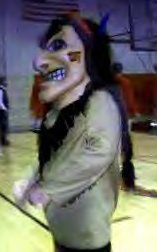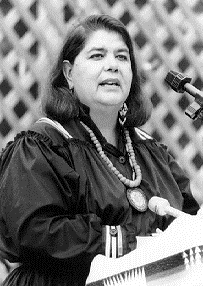Most Americans admit knowing little of contemporary Indian life; Indians eager to show successes and continuing challenges
The research is available online at: http://www.publicagenda.org/WalkingaMile
Given the limited documented opinion research on the topic, this study may be one of the most in-depth examinations of the thinking of these two groups about each other yet undertaken. The findings are based on the views of people in 12 focus groups conducted in 2006 and 2007 throughout the United States: seven with Indians and five with non-Indians.
“This study sheds important light on the challenges created by misperceptions of contemporary Native America. It certainly accords with what we see and hear on the ground,” said Joseph P. Kalt, Co-Director of the Harvard Project on American Indian Economic Development at the John F. Kennedy School of Government.
“Public Agenda's report is a critical step in furthering Indian White relations,” said Ruth Yellowhawk of the Indigenous Issues Forums. “Until we examine those places where we are struggling, and key knowledge gaps that exist we cannot understand ways to move forward with dignity and grace. Let's hope that this small step of revealing ways people are thinking allows for the kind of self-reflection that can engender positive action for such disparate nations.”
The research details the thinking of both groups regarding Indian history, the present and how better understanding can develop in the future. The research shows how little most Americans know about the diversity of contemporary Indian experience and points to the need for depictions of Indians outside of casinos and impoverished reservations.
While the Indians interviewed for the research described their sadness about the past and widespread prejudice and discrimination against Indians today, they also talked about their hopes and feelings of success--their pride in the great strides Indians have made economically and theirs sense that their lives are improving.
The research also points to a number of revelations that call for additional research. For instance, why non-Indians acknowledge that Indians have been badly mistreated in the past, on the one hand, and yet at the same time resent what they see as “preferential treatment” by the government, on the other. The report also notes generally more favorable attitudes toward Indians among Americans living far from concentrations of Indian populations and a somewhat higher prevalence of more negative views among those living closer to Indian reservations.



12 comments:
I read all 32 pages and it says nothing new that all Indians didn't already know. What these researchers should have done was just ask an Indian, we could of told them verbatim what the white folks were going to say. They didn't have to waste their time with research and a poll.
Anonymouse
Writerfella here --
Ah, but the researchers got paid and otherwise earned their grants by conducting research and a poll.
It's like an old Native joke from the 30s: Chief Lion of the Kaw became quite famous for being able to predict the weather in central Kansas. Each day, whether anyone gathered at his house or not, Lion would come out at daybreak and pronounce what the weather was going to be. After a time, newspeople and neighbors began to gather in Lion's yard to hear his weather pronouncements. And, amazingly, most of the time, Lion was right on the money. Came the day when people watched Lion emerge from his house, look at the sky and the crowd, and then go back in after saying nothing. A reporter finally knocked on the door and, when it was opened, said, "Chief, what's the weather going to be?" And Chief Lion replied, "No weather today. Radio broken..."
All Best
Russ Bates
'writerfella'
Did you know the part about how non-Indians admit they don't know much about Indians but would like to learn more? I wouldn't have bet on that outcome.
It's always good to have data to confirm one's claims and arguments. As a non-Indian, I can point to this study and say, "Don't take my word for it. Here the evidence showing what Indians think."
The study suggests that Hollywood and schoolbooks are the major sources of Native stereotypes--not parents, churches, or the community, as Russ would have it. You may know everything in the study, Anonymouse, but it still has things to teach people like him.
Writerfella here --
Oh, pish and tush. writerfella knows that word choices in writing always are paramount, even universal, but never 20th Century Fox. A writer whose word choices betray his abilities and reveal their limitations never can be trusted, no matter what that writer THINKS he knows, public agenda or no public agenda...
All Best
Russ Bates
'writerfella'
Once again, a study proves my contention about the source of Native stereotypes. Once again, you have no answer to the facts in front of your face. So noted.
Writerfella here --
What facts? In front of whose face? Who conducted that purported study? Natives or EuroMen? That should tell you the true value of such researches. Nixon, and now even Bush, will tell you that their 'researches' revealed that the American public supported their various wars, despite what the true tenors of public opinion may have existed. What one chooses to believe and what is the real truth may be varying by 360 degrees. It becomes a matter of choice, and that tells everyone who you are. After all, it was in all the papers...
All Best
Russ Bates
'writerfella'
What facts? Facts such as these (from The Harm of Native Stereotyping: Facts and Evidence):
Native American youth say the media has a powerful influence on perceptions of people of color and that they see themselves characterized as "poor," "drunk," "living on reservations," "selling fireworks," and "fighting over land." Whites and African Americans are also seen by these young people as racially stereotyped on TV -- "black people are always funny," "white people are all rich and stuff."
--"Native American Children Recognize Media Stereotypes," Oklahoma Indian Times, July 1999
"Is there a growing anti-Indian sentiment in the country?"
Yes 76%
No 13%
Unsure 11%
"What do you believe is the primary cause of anti-Indian sentiment?"
Media stereotypes 45%
US government 33%
Systemic racism 22%
--Indian Country Today poll of 450 American Indian opinion leaders, 10/18/00
Most people polled (57.4 percent) felt that public schools do not teach enough American Indian history, while 74.3 percent would request more American Indian studies courses from colleges and universities.
About half of these polled American voters, arguably representative of the mass of Americans, get their information on American Indian issues from TV news, some 25 percent from newspapers and 7.7 percent from radio. Even so, they overwhelmingly (71.6 percent) report distrust for the accuracy of the images and characters of American Indians portrayed by Hollywood. The more education, the more distrust. Teachers-educators (78.4 percent) believed this most strongly.
--From a Zogby Poll reported in Indian Country Today, 2/14/01
I don't know the ethnicity of the people who conducted the study. But we're talking about one study vs. zero studies. You have no study, no facts, no evidence to back up your claims. All you have is your opinion, which is worthless compared to that of the Native experts who have studied the issue. These Natives say the media is the primary source of Native stereotypes.
Hmm...a bunch of Native experts or one Native non-expert? Tough choice, but I'll have to go with the experts over the non-expert. These Natives have studied and analyzed the issue much more than you or I have.
At least one Native--Ruth Yellowhawk of the Indigenous Issues Forums--and one Native organization--the Harvard Project on American Indian Economic Development at the John F. Kennedy School of Government--have endorsed the study. The implication is that Natives consider the study valid regardless of who conducted it.
Even Anonymouse said it was nothing but the conventional wisdom among Indians. That presumably includes the part about stereotypes coming from Hollywood and schoolbooks.
Are you challenging the results of the study, or just arguing for the sake of arguing? In other words, do you disagree with what Anonymouse and "all Indians" know? If so, quit wasting our time and say so.
I "choose to believe" Hollywood and schoolbooks are the primary source of Native stereotypes. (Why? Because the facts and evidence say so.) You choose to believe they're a minor source compared to parents, churches, and the community. Readers can judge for themselves whose belief is closer to reality.
Writerfella here --
Wrongo, oh, Caped Crusader! writerfella said that that ALL those influences were equal or at least were equivalently comparable. NEVER has writerfella tried to say that the media were lesser in the face of other 'emotional education' sources, only that they were not ALONE in their influences as you have been striving so hard to claim and to prove. No man is an isolate from any or all of the forces that made him who he is, and that is one fact that is ineluctable, no matter how it is studied or not studied, regarded or disregarded.
All Best
Russ Bates
'writerfella'
Here are four of your quotes on the subject:
"Racial bias and cultural stereotypes have been communicated by families, schools, churches, communities, and cultures long before there were any [mass] media."
"If media were the teachers, everybody's ideas would be the same no matter the race or ethnicity or geographical area, as we all see the same media."
"Media do not teach stereotypes, they reinforce what already has been taught by parents, schools, churches, and the culture."
"Racist and stereotypical ideas...can be reinforced but not ordinarily introduced originally by books, movies, and/or TV."
Clearly, you posited a secondary role for the media at best. But if you've changed your mind about what you wrote, great.
Post a Comment